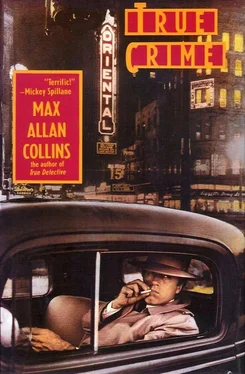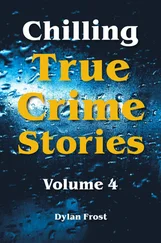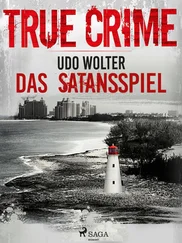“Velvet barley,” Louise explained. She pulled a stalk out of one of the shocks, crushed the head against her palm, lifted her palm to her lips and blew away the chaff. She held out her palm for me to see the seeds there. “You like beer?”
“Sure.”
“That’s the malting barley.” She dropped the seeds to the earth and moved on. “Mr. Gillis has fifteen acres of barley. They plant this stuff quick, soon as the ground’s fit.”
“How many acres does Gillis have here?”
“Eighty.”
“Is that big?”
“Not really. Not small, though.”
Birds were singing. I wasn’t used to seeing this much sky; in Chicago, in the Loop, you have to raise your head to see any sky. And the last bird I heard sing in the city was Anna Sage’s parakeet.
I asked, “Can he make a living at it?”
“He could if the prices were right. The livestock’ll get that barley. He can’t afford to sell it for what it’s going.”
“You ought to be able to make a living with land like this. Crops like these.”
She shrugged, walking ahead of me now. Not holding my hand — leading the way.
“Mr. Gillis does all right with his sideline,” she said.
“You mean taking in house guests.”
She nodded.
“You ever stay here before?” I asked her.
She nodded again. “A few times.”
We were at the edge of the barley field, now. Some stones were scattered about, some of them nearly boulders, big cold seeds not worth planting. She pointed.
“That grass is Mr. Gillis’ hay. He’s got about six acres in grass. For the cows and horses.”
We walked along, skirting a patch given to more stones and nettles. “Always a patch or two a farmer can’t tame,” she explained. “There’s the corn.”
I walked behind her, like an Indian, down green rows of corn only a few feet high. Silo corn, she said; planted late to keep it green. It would go eight feet. Up ahead, she said, was some corn Gillis had planted around the end of May.
I followed her down these rows, too, but they were damn near as tall as I was. The air here smelled sweet; up ahead Louise was breathing it in, smiling. At home.
We passed a field of yellow sweet clover, on our way to a field of (she said) alfalfa. She picked off a few tiny purple flowers, saying, “Relish for the cows.” Gillis only had a couple acres of alfalfa, not enough by her way of thinking. We walked past another field (oats, she said) cut and shocked, which she dismissed as pig feed.
“Because of the price?” I asked.
“The price,” she nodded. “My daddy got two dollars for an eighty-pound tin of milk, few years back. Now it’s less than a dollar.”
“That’s rough.”
“It’s the banks. That’s why I don’t think it’s so bad, what Candy and the others do.”
“Rob banks, you mean.”
She glanced at me, brown eyes wide. “Sure. All the banks ever do is foreclose on farmers.”
We were to a big white-flowered field, riffling in the slight morning breeze. Buckwheat, she said.
“Just an acre,” she went on. “Used for chicken and hog feed. You know what he could get selling it? Penny a pound.” She shook her head. “Farmer’s life.”
“But you miss it, don’t you?”
She was looking at the ground, watching her feet as she walked. “Maybe. A little.”
I followed her down into a hollow and we sat under some trees. Another bird was singing. I asked her what kind it was.
“Robin,” she said. “He doesn’t know from the Depression.”
“Why don’t you go back home, Louise?”
“Home?”
“The farm.”
“I can’t do that.”
“Why?”
She was sitting with her knees bunched up, clutching her legs with clasped arms; she had nice legs, by the way. White. Smooth.
“I was married. Still am, really.”
“I see.”
“He was bad to me. Worse than my daddy, even. He was a lot like my daddy, really. Maybe that’s why I took up with him.”
That seemed a pretty fair insight for a girl who was part farm girl, part moll. Louise was somebody who had the promise of being her own person, if she could just break away from the sordid world Candy Walker had introduced her to.
“Couldn’t you go back to your daddy?” I asked.
“Would he take me back?”
A rhetorical question, but I thought about answering it, anyway.
Before I could, she answered it herself: “He wouldn’t want me back. I’m a sinner. A fallen woman. And as for Seth, he’d probably shoot me. He said as much.”
“He did?”
She hugged her legs, as if chilled. And it wasn’t chilly.
“He said if I ever took up with another man, he’d see me dead.”
I thought about telling her what her father had told me — that her husband Seth had already taken up with another woman (or two), and could care less about getting her back, at this point; it had been a year, after all.
“And even if Seth wasn’t a problem, I don’t know if I’d want to go back to my daddy even if he’d have me. Go back to some stupid little farm after the life I’ve seen?”
I didn’t point out that we seemed to be on a stupid little farm at the moment, and that the life she’d seen with Candy Walker was a squalid nightmare.
But I did say, “Maybe you should start over. Just go to a big city and find a job.”
She released her legs and stretched them out in front of her; the pink dress was up around her knees. Nice calves, as we say down on the farm.
She said, “I did have some typing in school. I had almost two years of high school, you know.”
“You speak well. Express yourself well.”
She liked hearing that; she gave me a broad, toothy smile that was as refreshing as that sweet smell back in the corn rows. She said, “I read a lot, you know. I like the movies, too. I always thought I’d be... you’ll laugh.”
“No I won’t.”
“An actress. There, I said it, go ahead, laugh. Every dumb little farm girl wants to run off to the big city and be a star.”
“Sometimes it works out,” I said, thinking of Sally.
“Well, at least I ran off. I don’t suppose my life is so different from being in show business.”
“You’re sure on the road a lot.”
“But even a typist. A secretary. That wouldn’t be so bad, would it? That’d be a step up, and in a big city. I can’t stay on with the Barkers and all. With Candy gone, I just don’t see why I’d stay.”
I touched her shoulder. “Why not go home, at least give your father a chance? Then you can go to the big city, if you like. I got friends in Chicago, for instance. Maybe I could help out.”
She touched my face with a hand that smelled nicely of grain; the hand she’d cracked the barley stalk with. She said, “You really are sweet, my Gentleman Jim.”
She really did read, didn’t she? The romance magazines, that is.
She was saying, “How can anybody be so good and honest as you?”
Since I was a liar trying to manipulate her into doing my client’s bidding, I couldn’t wholeheartedly agree with her.
So I just said, “I’m not, really. I just think a girl as pretty as you doesn’t need a life as shabby as this.”
I thought she might take offense, but she didn’t.
She raised her skirt. Lifted it slowly, up over her thighs. Up to a yellow fringe between her legs. No underthings.
She wasn’t bashful, this girl.
“I know Candy is fresh in his grave,” she said, “but it doesn’t matter. He’s gone, and you’re here — and I want you. I need you. You could make me feel better.”
This would go over real big with my client.
I said, “I don’t think I should, Louise.”
She reached behind her and was unbuttoning the dress; then she was easing it down to her waist and her breasts were round and her nipples were pink and I unbuttoned my trousers.
Читать дальше












